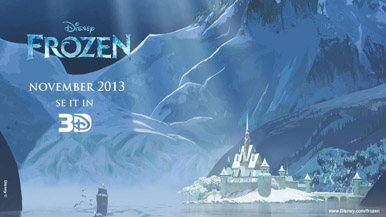The 400-Word Review: Frozen
By Sean Collier
November 28, 2013
BoxOfficeProphets.com

It’s surprising, then, that the biggest step forward American animation has made in years comes not from Steve Jobs’ blockbuster studio, but from its partner company. Frozen, Disney’s animated musical based on the Hans Christian Andersen tale The Snow Queen, is not only a very good movie, but an undeniably successful assault on the gender problem that has plagued children’s fare for a century.
Elsa (Idina Menzel) and Anna (Kristen Bell) are sister princesses in the fictional (but undeniably Norse) kingdom of Arendelle. Elsa was born with the ability to magically control, create and manipulate snow and ice; while using it for a late-night winter romp, she inadvertently deals a near-fatal injury to Anna. The girl is saved, but the King and Queen are wary; they convince her to hide her powers, lest she hurt anyone else.
When the royal parents perish at sea, the palace gates are shut, leaving Anna — who has no memory of the accident — and Elsa to grow up alone. Years later, Elsa must assume the throne, risking exposure and further calamity; another accident does indeed reveal her powers, and Elsa flees into the woods, casting Arendelle into a never-ending winter.
It’s on Anna, then, to find her sister and find a way to break the curse, and in that, the clichés begin breaking. While Anna does have a prince for a love interest, he’s left to tend house in the castle while Anna tears off into the woods; while she does meet a dashing woodsman en route, he plays the clumsy obstructionist while Anna is the headstrong heroine.
Speaking vaguely to avoid spoilers, the reversal of typified roles doesn’t end there; this is not a film that hinges on a prince-meets-princess, happily-ever-after resolution. Rather, it’s a film decidedly and unabashedly about sisterhood, honesty and embracing of one’s self; perhaps the strongest theme is the rejection of self-denial.
Sound like any other Disney movie you can name?
This is precisely the kind of family film that’s sorely necessary, long overdue and potentially powerful. If Hollywood is ever to break its still-regressive hang-ups about gender, sexuality and storytelling, it must train audiences from an early age — which is precisely what Frozen does, effortlessly. This film belies the backwards adage that young boys will reject a film with female leads; there were plenty of tiny males in the audience with which I viewed Frozen, and none seemed confused or put off. (A very vocal lad behind me was positively enthralled.)
Aside from those advances, though, it’s an excellent movie on its own merits. The musical numbers by husband-and-wife songwriting team Robert Lopez and Kristen Anderson-Lopez are catchy without the showtune smaltz that has drowned several Mouse House productions. The animation is impressive, with displays of ice, snow and forest that impress even two decades into the advent of computer animation. There are even unexpected twists to this tale, once thought impossible in mainstream family films.
If there’s one flaw to Frozen, it’s an unsurprising and forgivable one: The project is so destined for Broadway that it seems the script was laid out with opening night in mind, and several decisions seem to serve the on-stage prospects of the musical more than the on-screen product. That’s inevitable, though. With no qualifications: Frozen is one of the best animated features in the past decade, and one of the most important ever made.
Sean Collier is the Associate Editor of Pittsburgh Magazine and a member of the Broadcast Film Critics Association. Read more from Sean at pittsburghmagazine.com/afterdark